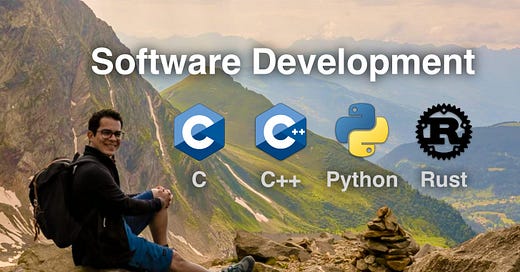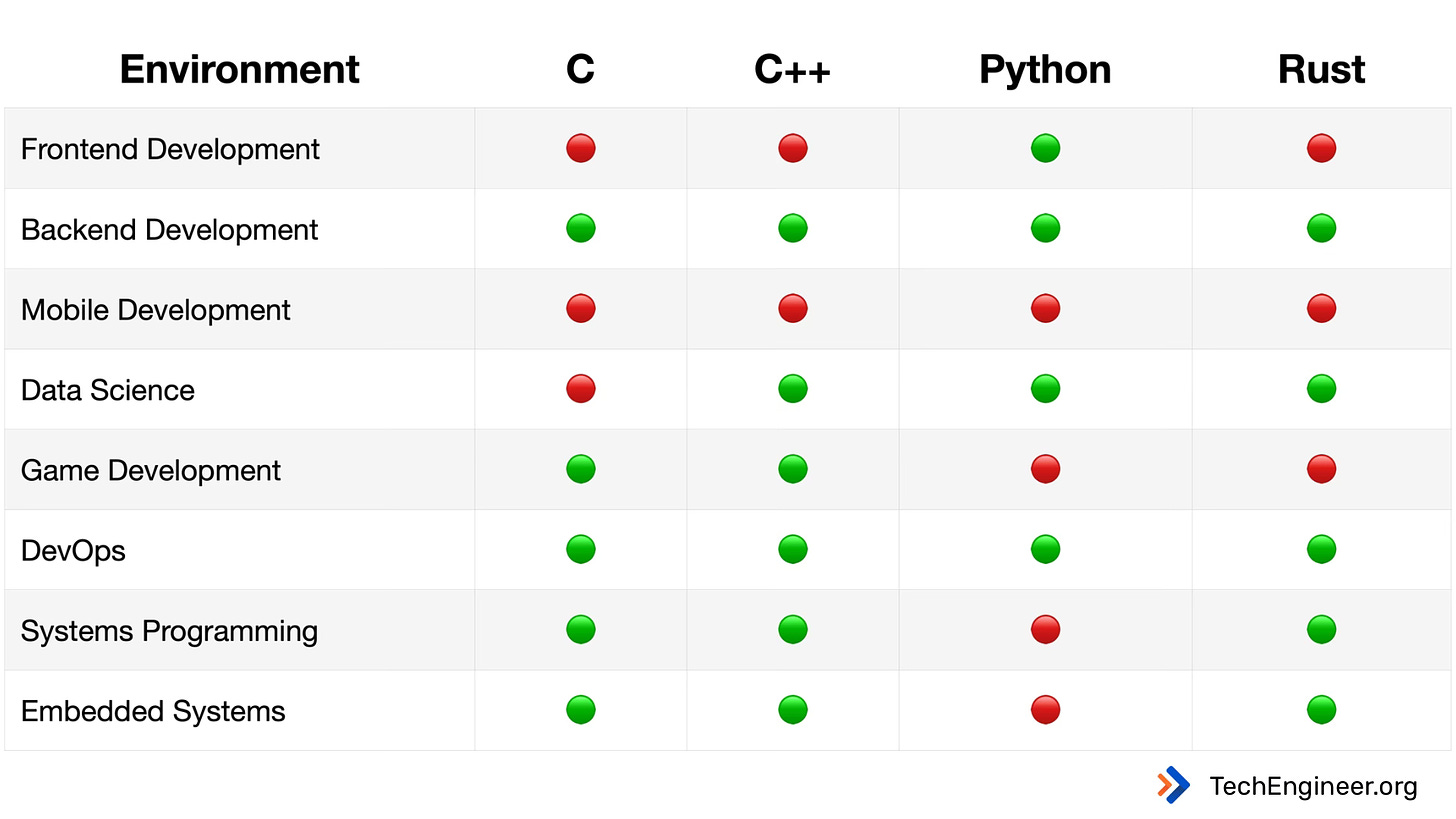Choosing the right programming language can feel overwhelming, especially with so many options like C, C++, Python, and Rust. Each language brings distinct advantages to the table, and understanding when to leverage one over another can significantly enhance your team’s efficiency and drive innovation.
In this article, we’ll talk about C, C++, Python, and Rust, exploring their unique characteristics to help you choose the right one.
C: The foundation of modern computing
C, created by Dennis Ritchie in 1972, is often regarded as the foundation of modern programming languages. Built around the imperative programming paradigm1, it offers unmatched control over hardware and system resources. C is widely used for its performance, simplicity, and precise resource management.
Here are some projects developed in C:
🛠️ Operating Systems
Linux
Windows
macOS
📡 Embedded Systems
Arduino
RTOS
🗄️ Databases
MySQL
PostgreSQL
SQLite
Redis
🌐 Network Programming
OpenSSL
Wireshark
NGINX
cURL
🕹️ Games
Doom
Quake
However, with great power comes great responsibility. C requires you to manually manage memory and ensure that your code doesn’t access unauthorized resources. It demands a solid understanding of algorithms and memory management to avoid introducing instability or security vulnerabilities.
While C might not handle memory safety2 automatically, it’s far from obsolete. Mastering it can empower you to write highly efficient, optimized code, making it a timeless and valuable tool in any developer’s toolkit.
C++: The versatile workhorse
C++, created by Bjarne Stroustrup in 1979, builds on the fundamentals of C and introduces Object-Oriented Programming (OOP)3. With C++, you get both high-level and low-level control, enabling you to write efficient and complex applications.
Here are some projects developed in C++:
🛠️ Operating Systems
Linux
macOS
Windows
📡 Embedded Systems
Tesla Autopilot
ROS
DJI Drone SDK
🗄️ Databases
MongoDB
⭐️ Popular Applications
Microsoft Office
Google Chrome
Photoshop
Adobe Premiere Pro
Blender
🤖 Machine Learning and AI
TensorFlow
PyTorch
🕹️ Games
Unreal Engine
Counter-Strike
C++ has also faced criticism for not being memory-safe like C, requiring manual memory management, which can lead to issues like memory leaks. While newer languages offer safer alternatives, C++ is a mature and efficient language that won’t become obsolete anytime soon and offers many job opportunities.
Python: The friendly programming language
Python, created by Guido van Rossum in 1991, follows the object-oriented paradigm. Python’s simplicity, readability, and versatility make it a great choice for both beginners and experienced developers. Its extensive libraries and frameworks make tasks like data analysis, web development, and machine learning more accessible.
Below is a list of projects using Python:
🌐 Web Development
Django
Flask
⭐️ Popular Web Applications
Spotify
Dropbox
Instagram
Reddit
📊 Data Analysis and Visualization
Pandas
Matplotlib
Jupyter Notebook
🤖 Machine Learning and AI
TensorFlow
PyTorch
ChatGPT
Grok
Python doesn’t have memory issues like C or C++, but it might be slower for large data jobs compared to other programming languages. However, Python’s simple syntax helps developers work quickly and build prototypes fast, which is harder in languages like C, C++, or Rust.
Rust: The modern programming language
Rust, created by Graydon Hoare in 2010, is a systems programming language that prioritizes safety and performance. Unlike C and C++, which require manual memory management, Rust uses a borrow checker4 to ensure memory safety at compile time.
Memory safety problems, such as buffer overflows and dangling pointers, are common in languages like C and C++ and can lead to serious security vulnerabilities. Rust’s borrow checker prevents these issues by enforcing strict rules about how memory can be accessed and modified, making it a safer choice for critical systems.
Below is a list of projects using Rust:
🛠️ Operating Systems
Redox OS
Firecracker MicroVM
🗄️ Databases
TiDB
Sled
🌐 Web Development
Dioxus
Leptos
🤖 Machine Learning and AI
Polars
Candle
Grok
🔗 Blockchain
Solana
Polkadot
Lightning Development Kit
Rust offers many advantages over C and C++, but it has some drawbacks. Its memory safety mechanisms can be challenging for newcomers, requiring time to master, potentially slowing development. Rust’s complex compiler often leads to longer compile times, which can be frustrating during development. Rust’s ecosystem remains smaller than C++, meaning fewer libraries and tools may be available, and more custom code might be needed.
When to choose which language
⚙️ C
If your goal is to gain a deep understanding of how computers operate or you’re handling projects that demand precise hardware control, C is the ideal choice. Whether you’re a developer or a company seeking performance-driven solutions, C offers the low-level access needed for optimized results.
💻 C++
For projects that prioritize performance, leveraging object-oriented programming and a robust standard library, this language is an excellent choice. It excels in game development, desktop applications, and high-performance computing, making it ideal for both developers and companies seeking innovative solutions.
🐍 Python
If you’re looking for a programming language that’s easy to learn and backed by a rich ecosystem of libraries, Python is a great choice for both companies and developers. Its versatility makes it ideal for data analysis, web development, and machine learning, enabling fast prototyping and innovation.
🦀 Rust
If your company values safety, speed, and concurrency, Rust stands out as an excellent choice. It’s ideal for systems programming and embedded systems, making it perfect for projects that demand high reliability. Embracing Rust can help improve your team’s productivity in the long run and deliver robust solutions.
Takeaways
No programming language is better than the others, only better for certain tasks. Consider the projects you aim to develop and choose the language that best aligns with your goals. Mastering one language will make it easier to explore others, enhancing your versatility as a programmer and preparing you for any challenge. Embrace the opportunity to experiment with various languages to discover the one that resonates with you and meets your needs.
I hope you found this helpful! Share your thoughts, questions, or experiences. Let’s connect on LinkedIn or YouTube and build a community together.
See you next week.
Notes
https://en.wikipedia.org/wiki/Imperative_programming
https://en.wikipedia.org/wiki/Object-oriented_programming
https://en.wikipedia.org/wiki/Memory_safety
https://msrc.microsoft.com/blog/2019/07/a-proactive-approach-to-more-secure-code
https://en.wikipedia.org/wiki/SQL_Slammer
https://cloud.google.com/blog/topics/threat-intelligence/smb-exploited-wannacry-use-of-eternalblue
https://www.lookout.com/threat-intelligence/article/trident-pegasus-technical-details
https://tonyarcieri.com/would-rust-have-prevented-heartbleed-another-look
https://googleprojectzero.blogspot.com/2015/09/stagefrightened.html
https://blog.qualys.com/vulnerabilities-threat-research/2015/01/27/the-ghost-vulnerability
Imperative programming is a paradigm where programs describe a sequence of commands for the computer to follow, focusing on how tasks are performed.
Memory safety refers to the protection from errors related to memory access, ensuring programs only access memory they are permitted to and preventing issues like buffer overflows, null pointer dereferences, and use-after-free errors.
Object-Oriented Programming (OOP) is a paradigm where programs are structured around objects, which encapsulate data and behaviors, promoting modularity and reuse.
Borrow checker is a feature in Rust that enforces memory safety by tracking ownership, borrowing, and lifetimes of variables. It ensures references do not outlive the data they point to and prevents data races by controlling how mutable and immutable references are used.





This article is so informative and interesting even for such an amator in data science like me 🥹 I know that Python makes Instagram and this is important information for me😌 thank you Monsieur